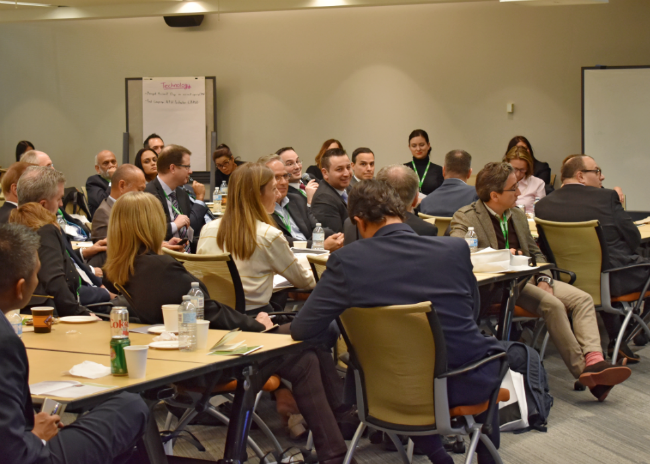Winner: Queen’s University IRC Professional Development Award

For the second straight year, Fidelity Investments Canada has earned the Queen’s University IRC Professional Development Award.
“It truly is a team effort,” says Linda Passarelli, vice-president of talent management at Fidelity in Toronto. “We support employees with all their professional development goals… and it’s great to be recognized for having such a great culture focused on employee development.”
“It starts with the employees themselves — identifying what their career aspirations are and the development needs that they have — working with their manager, and then the HR team. We are so grateful that we’re able to provide employees with the support and development opportunities that we are able to, to help them succeed and to help them to achieve their career aspirations.”
The mutual fund management company has more than 1,000 employees, with a mandate to hire great people and then make them better, she says.
Programming ranges from public speaking training to business etiquette — skills that can translate into a much broader life context. And that directive comes straight from senior leadership.
“Because we have a commitment from the top of our organization around professional development, we have the opportunity to go out and really partner with experts in their field,” says Passarelli.
“We’re not given a small pot of money. It really is ‘Go out there, find the best of the best, and let’s build it into our budget for the following year or in the current year if we can.’ We’re not hindered by budget… (and) I think we’ve got some of the best in the industry working with us.”
Program principles
A belief in feedback is priority number one, she says.
“We ask for it from the employees as often as we possibly can to understand what it is they’re looking for in terms of professional development,” says Passarelli. “Then it’s through the feedback loop that we identify new needs, we update what we’re currently offering, or change how we offer it.”
The company also goes to great lengths to provide employees with responses on their development, she says. “It’s through written feedback, verbal feedback. It’s working with their managers to make sure that the skills that they’re developing are supported.”
Fidelity also adheres to a 70-20-10 development rule in which 70 per cent of learning happens naturally on the job; 20 per cent is gained through interaction with others; and 10 per cent comes via specific training, says Passarelli.
“We offer a learning portal that has over 1,000 learning resources available to (employees) — anything from videos, podcasts of books, suggestions, articles, online learning — a whole variety depending on what their learning style is.”
Mentorships and reverse mentorship programming are offered on a voluntary basis, alongside a “generous” external training and tuition reimbursement policy, she says.
All employees enrol in business etiquette training, learning the art of a proper handshake or how to engage in appropriate small talk.
Fidelity also believes learning should be continuous, and all employees have access to a centralized training budget to ensure that happens, according to Passarelli.
“It really is an opportunity where employees identify what they want to work on,” she says. “It could be training, it could be attending a conference, or it could be tuition reimbursement.”
“We don’t put a cap on individuals, because we really believe that we really need to look at the individual needs. If they make sense, then we’re going to support them. And the centralized budget is pretty generous; we’re able to pretty much support all the needs that are out there.”
This commitment has increased levels of employee engagement and productivity, with last year’s engagement score coming in at 86 per cent, says Passarelli.
Sales development program
Fidelity’s sales development program is a training area that remains “near and dear” to Passarelli’s heart.
“It’s still industry-leading,” she says. “I know that our competitors are trying to replicate what we do… and I’m not trying to sound arrogant, but I really do believe that the reason that they can’t catch us is because every year, we change it — it’s not a once and done.”
Several program features help it stand alone, says Passarelli.
“There’s seven weeks of training that we put the employees through in sales. And at the end of every week, we go through an extensive debrief in terms of the elements that worked — what did they wish that we covered, what’s happening in the industry, what’s happening in terms of their client relationships? — to pick up on any trends that might be happening, where we might need to be able to support them. We use all that feedback.”
“It’s because we’re always learning new things that we need to change.”
And all development phases require an 80 per cent standard to move on, according to Passarelli.
“We’ve really worked hard at making sure that we’ve set the bar high,” she says.
“We may set the bar high, but we know that they can reach it with the support that they need. We’re not there to fail people because we want them to fail; we believe that they can achieve higher standards with the right support, so we get them all kinds of coaching and feedback.”
This year, the “art of networking” was a new addition, giving practical tips to salespeople on how to best entertain clients, says Passarelli.
Another segment to be introduced will look at the best practices of selling to women, specifically.
“We’re going to focus on not only selling to their clients, who may be female, but helping advisors who are their clients sell to women,” she says.
“We’re always looking for those ideas in terms of ‘There’s core skills that they all have to learn, but what else can we do to support them and be successful out there?’”




